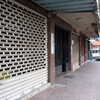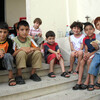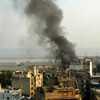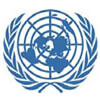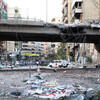
Israel must provide safe passage to relief convoys
19 July 2006
In one incident on Monday, Israeli missiles struck a convoy of trucks from the United Arab Emirates near the town of Zahleh as it approached Beirut from Syria, damaging or destroying three of the trucks, as well as four passenger vehicles. Washington Post and Agence France-Press reporters at the scene wrote that the trucks contained supplies of medicines, vegetable oil, sugar and rice. The Red Crescent Society of the United Arab Emirates (UAE RC) said in a statement that the convoy contained medical supplies and medicines, as well as several ambulances. Read more about Israel must provide safe passage to relief convoys

